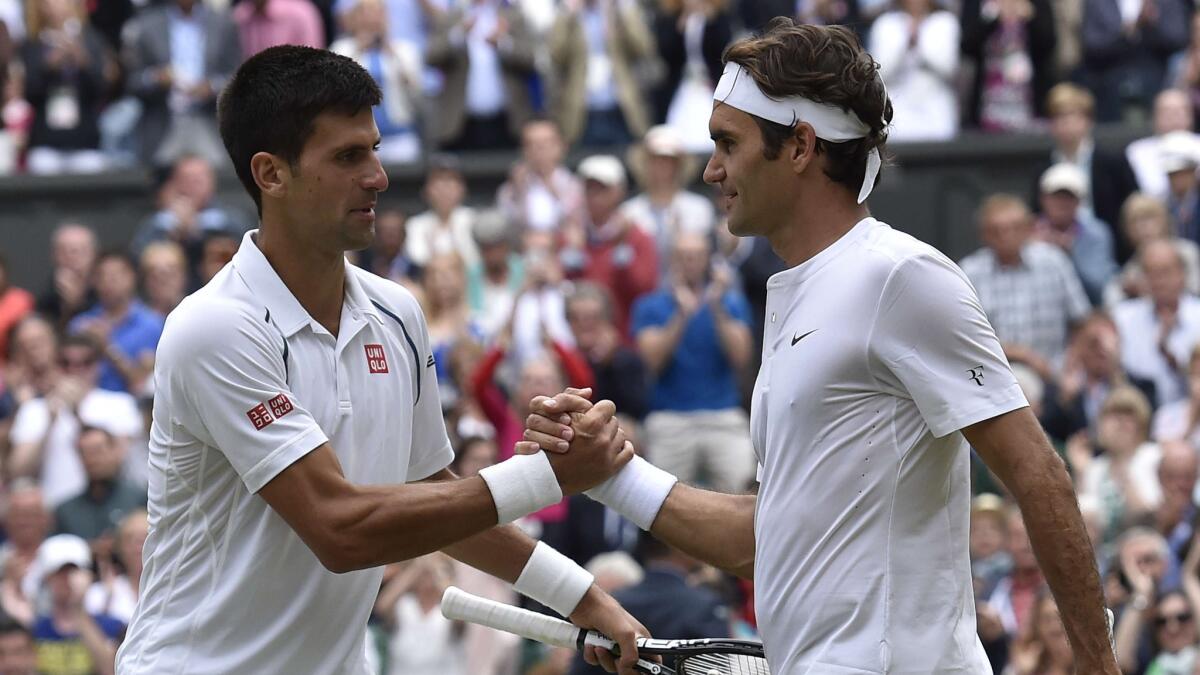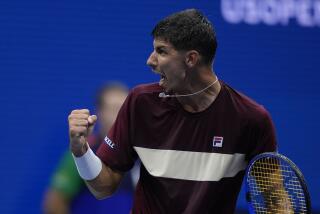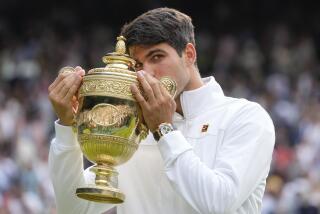Roger Federer still great but Wimbledon champ Novak Djokovic is better

Novak Djokovic, left, shakes hands with Roger Federer after claiming his third Wimbledon singles title on Sunday.
- Share via
FROM LONDON — It is increasingly obvious that Father Time is not messing with Roger Federer. Novak Djokovic is.
In the aftermath of Djokovic’s 7-6 (1), 6-7 (10), 6-4, 6-3 victory in the Wimbledon men’s final here Sunday, much will be written about how old Federer is. Instead, much should be written about how good Djokovic has become.
Federer will be 34 Aug. 8. He has won 17 major titles, most by any men’s player, but none since Wimbledon 2012. So the critics line up with wheelchairs.
He remains the second-best player in the world. His No. 2 ranking says that. So do his results this year. He’s won four titles and was 40-6 coming into Sunday’s match. Rest home applications will have to wait.
“I’m right there. My game is good,” he said afterward. “I played on my terms. Things are all right.”
Actually, things would be a lot better for Federer if Djokovic weren’t around. At one time, he was a solid part of the Big Four of men’s tennis — along with Federer, Andy Murray and Rafael Nadal. Suddenly, it is beginning to look like there is The One and The Other Three.
This was Djokovic’s second straight Wimbledon title, his third overall, and second straight over Federer in the final. It was his ninth Grand Slam title, which puts him one behind Bill Tilden and one ahead of some legendary names: Andre Agassi, Ken Rosewall, Fred Perry, Ivan Lendl and Jimmy Connors.
Federer was asked afterward about where he thought Djokovic’s tennis legacy stood at the moment.
“Moving up,” he said.
Had he not lost the French Open final to Stan Wawrinka, Djokovic, 28, would be heading to New York and the U.S. Open with the same goal as Serena Williams — a calendar-year Grand Slam. In January, he won his fifth Australian Open.
Sunday’s victory took place on his first wedding anniversary.
“Ever since I got married, and became a father,” he said, “I haven’t lost many matches, I won many tournaments. I suggest that to every player. Get married, have kids, enjoy this.”
That will work, as long as you add an incredible baseline and service-return game that neither Federer nor anyone else on the tour can seem to counteract.
Djokovic won the first set after being down a break and then engaging Federer in baseline rallies in the tiebreaker. Federer is sensational off the ground. Djokovic is better. He can bend, stretch, run and reach better than anyone in the game. He is the sport’s Gumby. If Federer’s ground strokes were landing three feet from the baseline, Djokovic’s were two feet closer to it.
He can, and does, produce angles with his two-handed backhand that appear impossible. In his next life, he will star in Cirque du Soleil. He gets to the ball faster and hits it deeper and harder than anybody in the game.
Federer, to his credit — and with ultimate net-rusher Stefan Edberg in his coaching box — did his best not to get involved in trading baseline shots. He served and volleyed 32 times, Djokovic zero. He approached off a ground stroke 58 times, Djokovic 34. Federer had 58 winners, 25 of them at the net. Djokovic won 72 points from the baseline, Federer 50.
Statistics will be far less remembered by the packed house of 15,000 at Centre Court, where the fans love Federer and his seven titles here, and were sent into a frenzy in the second-set tiebreaker.
Djokovic got it to 6-3 and Federer saved all three set points. Then he saved four more while losing one himself at 8-7. Finally, Federer served and volleyed successfully at 11-10 and the place shook. Djokovic whacked at the bottom of his shoes with his racket, as if bad traction were the culprit.
“Very frustrating on the changeover,” Dokovic said, “[because] I knew I cannot let this happen against Roger in the finals of Wimbledon. . . .”
Hardly. The second set took 65 minutes. The next two would take a total of 66.
When Federer missed a sitter at the net to be broken and go down, 1-2, in the third set, the end was in sight. On his first set point at 5-4, Djokovic closed it out with a routine overhead.
Djokovic’s service break again came early in the fourth set, and was yet another confirmation of what Richard Gasquet said of Djokovic’s game after losing to him in the semifinals.
“Returns, returns,” he said. “You serve and there is the ball, back on your side of the net.”
With Federer serving at 2-2, Djokovic took a deep first serve and returned it off the chalk on the baseline. Federer, caught flat-footed, could only try to flick it back, and it went into the net.
On his first match point, Djokovic hit a massive inside-out forehand that Federer couldn’t touch. He threw his hands into the air, pounded his chest, pointed to his coach, Boris Becker, and his team box and eventually knelt on the grass, picked a piece and chewed it. He said that was something he envisioned himself doing when he dreamed of winning Wimbledon as a youngster.
“It’s gluten free,” he said.
Another title by Federer would have been a record eighth here. He and Pete Sampras remain tied for now at seven.
Djokovic won about $3 million (depending on the British pound’s conversion rate). Federer had to make do with about $1.5 million.
But that financial shortfall wasn’t the worst news for the Swiss tennis legend. That came in Djokovic’s post-match news conference.
“I’m 28,” he said. “I feel good. I don’t feel old. I have, hopefully, many more years in front of me. I’m going to try to push my own limits and see how far I can really go with titles, and with myself playing in this high level.”
Sorry, Roger.
Twitter: @DwyreLATimes
More to Read
Go beyond the scoreboard
Get the latest on L.A.'s teams in the daily Sports Report newsletter.
You may occasionally receive promotional content from the Los Angeles Times.











